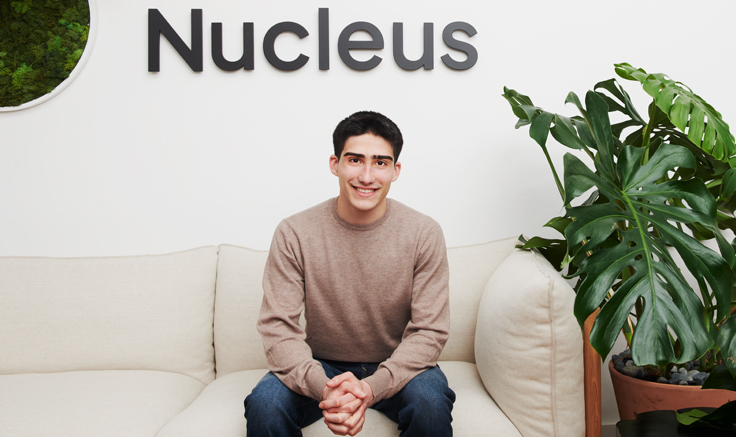
March 25, 2024
Nucleus Genomics is realizing the dream set into motion long ago by the Human Genome Project: to use the power of genomics to help people live lives that are as healthy and long as possible.
Nucleus’s health application harnesses the power of whole-genome sequencing (WGS). WGS is a comprehensive method for analyzing entire genomes, capable of capturing DNA variants with subtle impacts as well as rare, high-impact variants. Unlike nearly all other DNA analyses, WGS can unearth risks for common conditions like cardiovascular disease and cancer, as well as identify thousands of rare genetic disorders.
Now, Nucleus is working with Illumina to scale their vision of leveraging WGS to build a more proactive health care system where people have greater agency. The initiative follows an exponential drop in the price of sequencing a genome and will further the effort to make WGS widely available to the public.
It’s a mission that was inspired by tragedy. In 2005, founder and CEO Kian Sadeghi’s 16-year-old cousin died suddenly in her sleep. Doctors suspected she may have had long QT syndrome, a rare congenital heart disorder. Sadeghi’s parents thought it may be “bad genetics.”
“I realized that an accessible health platform that uses genomics and lifestyle data to analyze disease risks could have made a life-changing impact on my family,” Sadeghi says. “That’s what we want to build for everyone. That’s what Nucleus can be.”
Sadeghi focused on creating a web application that would redefine how people understood the way their DNA shapes their health and well-being. He conducted extensive research, eventually envisioning a consumer application that combined the forefront of research on genomic technology and analysis, particularly WGS.
He assembled a core team of scientists, clinical geneticists, engineers, operators, and writers with a wide range of skills and knowledge. According to Sadeghi, Nucleus’ strength stems from the team’s collective passion for bringing a unique and revolutionary product to people’s everyday health care experience.

In 2022, Nucleus received a total of $18 million in funding, largely from Reddit founder Alexis Ohanian’s venture capital firm, Seven Seven Six, and Peter Thiel’s Founders Fund.
“Our product will ultimately combine more than 70,000 separate genetic tests into one,” says Sadeghi. “We won’t need to have tens of thousands of different laboratories each offering a different genetic test. WGS supersedes nearly all the others, from single-gene tests for hereditary cancers to small panels and carrier screenings for rare diseases.”
Nucleus also provides polygenic risk scores (PRS), a type of analysis that illustrates the combined influence of common DNA variants on a person’s disease risks and trait dispositions. Nucleus’s PRS analyses can capture the collective effect of over a million of these common variants on each person’s health and wellness.
And their analysis goes a step further, combining genetic data with nongenetic information for a more comprehensive picture of a user’s risk. Knowledge of factors such as age, body mass index, cholesterol levels, and sex assigned at birth enable Nucleus to deliver both relative genetic risk percentiles and individual estimates of absolute risk. In each report, the numbers are framed by clear illustrations and understandable language.
“We understand the importance of making genetic information available to consumers, and the equal responsibility to keep such vital information strictly confidential and within their full control,” says Varun Jana, Nucleus’s chief technology officer. “Nucleus will implement some of the healthcare industry’s most stringent data privacy and security procedures.”
The company counts increased diversification of genomics datasets among its goals. They aim to foster a better relationship between the scientific community and communities that historically have been underserved and underrepresented in medical and genetic studies.
“Our team hails from four continents,” Sadeghi says. “That diversity is a testament to what we want to build in genetic databases. One of our highest priorities at Nucleus is to build a more equitable genomics future.”
It may be a long-term goal, but in the meantime, the Nucleus platform accounts for such imbalances in genetic data. “We statistically account for people of different ancestries, so that anyone can gain viable and helpful insights into their genetic disposition. It’s a difficult problem to solve, but we’re moving closer to the goal every day.”
Nucleus has earned CLIA certification and is pursuing CAP accreditation for its WGS informatics laboratory. The platform will launch in the US in 2024.
“Our goal is to dramatically advance the adoption of genetics into the health care ecosystem,” says Sadeghi, “and to usher in a new era of preventive health care.”


